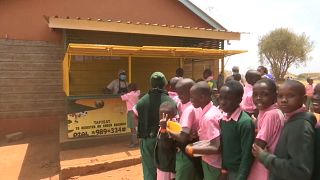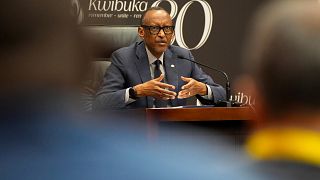Rwanda
The World Food Programme's Home-grown school feeding program has been making a big difference in the lives of schoolchildren in Rwanda. Implemented successfully in seven districts, this program provides nutritious meals to children, promoting their education, health, and sanitation.
The goal of the program is to ensure that every child receives a healthy meal every day by 2030.Rwanda has also taken a leadership role in the global School Meals Coalition, a group of 78 countries and 86 partners that supports sustainable school meals programs and emphasizes the human capital agenda. As a member of this coalition, the Rwandan government says it is committed to universal school meal coverage.
Ahmareen Karim, WFP Director in the country commended the government's efforts. "Rwanda is very commendable in how it has committed the government’s budget in the last few years, from 40 million francs in 2021 to now over 73 billion francs in this school year. That has also meant that school meals now cover 3.8 – 4 million school children from what was covered before in terms of only secondary school children, and now it’s pre-primary, primary and secondary children that are covered within this national school" Karim said.
The national school feeding programs however still faces budget constraints, To address this, Rwanda has reduced parental contributions and implemented tax reductions on rice and maize to reduce the cost of school meals and encourage the addition of more animal protein sources to the menu. But there are other needs according to Umampogoje Marie, headteacher of Ecole Populaire Muhima Rwanda.
"One challenge we still face is the fact that students still have their meals in classrooms, we do not have facilities such as dining halls for the students to use during lunch time. We also lack sufficient kitchen facilities to prepare enough food for the students, we request the government to consider solving this problem for the schools". told Africanews correspondent Diana Iriza in Kigali
Parents of the students’ contribution to school feeding is only Rwf975 per student per term (three months), that is 11% of the school feeding funding per term, while the Government contributes Rwf8,775 per student per term which is 89 per cent of the total Rwf9,750 school feeding funding per term.











02:24
Fragile peace in Eastern DRC as M23 reacts cautiously to Kinshasa-Kigali acccord
02:20
Morocco seeks to preserve traditional cooking and recipes through UNESCO project
Go to video
Gaza on the brink as aid ship attacked, fuel and medical supplies dwindle
Go to video
Equatorial Guinea secures investment-grade rating — But for how long {Business Africa}
Go to video
Rwanda agrees to give safe passage to SADC forces leaving the DRC
Go to video
Africa advances toward financial integration with new currency exchange marketplace{Business Africa}